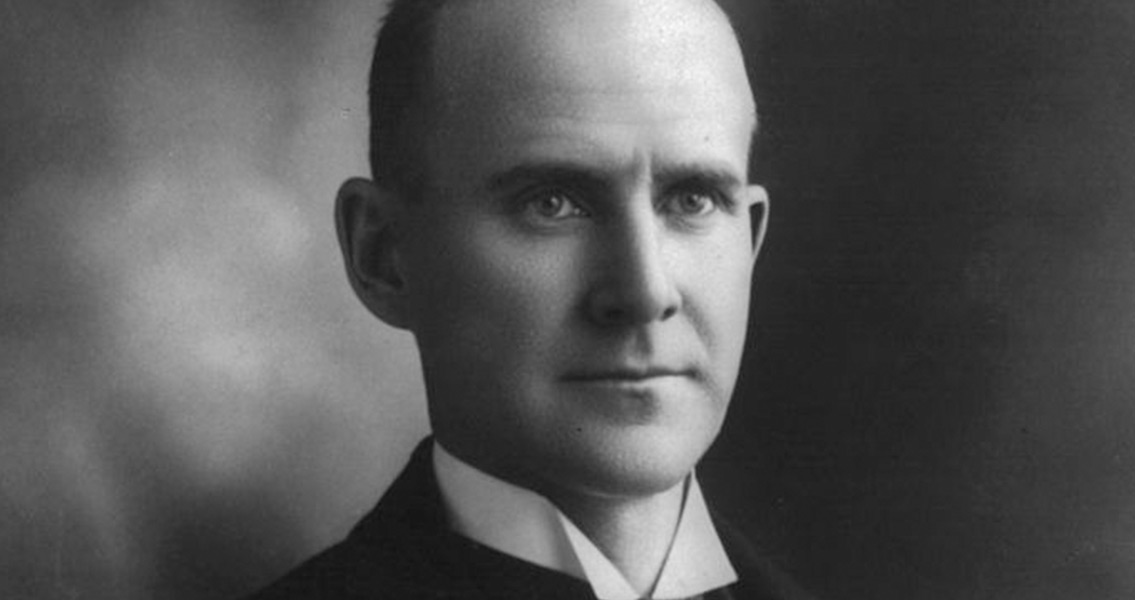<![CDATA[On the 23rd December 1923 Eugene Debs, one of the most important labour organisers in the United States and a former socialist presidential candidate, had his ten year prison sentence commuted by president Warren Harding. Debs had been sentenced in 1918 for his criticism of American involvement in the First World War and its treatment of anti-war campaigners. Harding's actions were not a pardon for Debs' alleged crimes, but reduced the sentence to the time he had already served, meaning Debs would be freed from Atlanta Penitentiary on Christmas Day. Eugene Victor Debs was born in Terre Haute, Indiana, in 1855. Like many young, working class men in the United States in the period, he left home to start work at a young age, employed on the railroads from the age of fourteen. He soon got involved in labour organisation, and in 1880 was elected national secretary and treasurer of the Brotherhood of Locomotive Firemen. Over the next few years he tried to unite the country's various railway brotherhoods, and in 1893 became the first president of the newly established American Railway Union. The union was the first industrial union, that is, one that represented all workers in a specific industry, rather than focusing on individual crafts. In 1894 the union had its first great success, when it won higher wages for workers on the Great Northern Railway. In 1897 Debs announced his conversion to Socialism, and helped found the Socialist Party of America. He was the party's presidential candidate in 1900, but in a disappointing campaign only received 96,000 votes. By 1904 the total had more than quadrupled to 400,000 votes, showing the increasing importance of labour relations in this period. He continued to run for president in subsequent elections up until 1920, with the exception of 1916. Debs was jailed in 1918 for his open resistance to US involvement in the First World War. As well as denouncing the war itself, he rallied against the Espionage Act, which essentially censored any public criticism of the war effort, and the draft recruitment of soldiers. From 1914 Debs and the American Socialist Party made clear their belief that the United States should not enter the war that had erupted in Europe. Debs argued that the conflict was the result of the inherent competition fostered by Imperialism, only being fought for the benefits of the 'ruling classes'. In an article from September 1915 he wrote; "When I say I am opposed to war I mean ruling class war, for the ruling class is the only class that makes war. It matters not to me whether this war be offensive or defensive, or what other lying excuse may be invented for it, I am opposed to it, and I would be shot for treason before I would enter such a war." Up until the United States finally entering the war in 1917, Debs and other socialists continued to make speeches arguing that the country should not become embroiled in Europe's conflict. Following the United States' declaration of war, several socialist party members were jailed for violating the Espionage Act. Debs made a speech criticising the Act and the effect it had on freedom of speech, in Canton, Ohio, on the 16th June 1918. Soon after he was arrested and sentenced. Despite being imprisoned, Debs remained a potent political force. In 1920 he was again the Socialist candidate for the US presidency, having his most successful campaign and winning over 900,000 votes. He also took a great interest in the unfolding Russian Revolution, denouncing it as not socialist, and horrified at the bloodshed, criminality and tyranny that was taking place in the name of communism. This highlights a key fact that should always be remembered when reflecting on Debs' life - in both intention and practice he was far removed from the most internationally well known advocates of left wing politics in this period - Lenin, Stalin and Trotsky. Debs' early release was the result of a number of things. The election of Warren Harding in 1920 seemed to yield a softer stance on violators of war time laws than that held by his predecessor, Woodrow Wilson. There was also a popular campaign to get Debs released, alongside growing concerns about his deteriorating health. Debs died on October 26th 1926, just under five years after his release from prison. His was a lifetime of trying to affect change through hard work and vigorous campaigning. His imprisonment in 1918 reveals just how much of a threat the US authorities considered him. Photo Credit: Wikimedia commons user: Tom]]>
The Release of Eugene Debs
